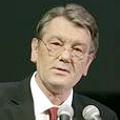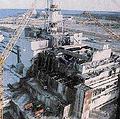 20年前烏克蘭車諾比核電廠爆炸與反應爐熔毀,堪稱世界上最嚴重的核子災難。烏克蘭總統尤申科在一場紀念研討會中向國際喊話,請求國際援助,以緩解該國處理後續事宜的龐大經費壓力。
20年前烏克蘭車諾比核電廠爆炸與反應爐熔毀,堪稱世界上最嚴重的核子災難。烏克蘭總統尤申科在一場紀念研討會中向國際喊話,請求國際援助,以緩解該國處理後續事宜的龐大經費壓力。
尤申科指出,「很顯然的,我們根本無力獨自解決這些問題,專家聲稱至2015年止,烏克蘭的損失預估將達1,700億美元,而烏克蘭在過去20年已花費150億美元來善後。」
「全世界都必須記取車諾比悲劇的慘痛教訓,避免類似災難再度發生,今日,我們以人民及環境安全為優先考量,這些對我而言才是真正重要的,」尤申科說。
戈巴契夫(Mikhail Gorbachev)在1986年4月26日車諾比發生事故時,擔任蘇維埃聯邦共產黨秘書長,如今他是環保組織「國際綠十字會」的發起人兼主席,他呼籲世界八大工業國領袖設立「全球陽光基金」,在未來10年募得500億美元。
戈巴契夫在一封寫給G8領袖的信中表示,「只要停止補貼石化燃料,如石油和煤炭,在廠房四周安裝太陽能光電設備,藉此降低價格、創造乾淨燃料科技的大眾市場,這筆基金就可輕易募得。」
在信中,戈巴契夫亦附上能源安全簡報,他警告人類若持續依賴石油、天然氣以及核子能源,而使再生能源淪為次等能源的危險。
車諾比災變被認為是史上最嚴重的核能意外事件,在四號核子反應爐爆炸之後,大火持續燃燒了十天,釋放出比1945年美國在日本廣島所投擲下的原子彈還強400倍的放射線物質到大氣層中。
地球之友(Friends of the Earth)在位於華盛頓的辦公室指出,「車諾比核變20週年紀念是最真實的警告,告誡我們核能是減緩全球暖化所應採用的最後選擇。」
地球之友同時提出警告,在具放射性核廢料問題和恐怖份子取得核子物質等問題解決之前,「核能工業正在世界各地的大規模擴展核電廠的設立,也花費數百萬美元製作廣告宣傳,散播核能是全球暖化的解決方案,並且將核能塑造為乾淨無碳的能源。」
 At a conference called to mark the 20th anniversary of the explosion and nuclear meltdown that destroyed Ukraine's Chernobyl nuclear power plant, President Victor Yushchenko called for an international donor conference to help his country cover the ongoing costs of dealing with the world's worst nuclear disaster.
At a conference called to mark the 20th anniversary of the explosion and nuclear meltdown that destroyed Ukraine's Chernobyl nuclear power plant, President Victor Yushchenko called for an international donor conference to help his country cover the ongoing costs of dealing with the world's worst nuclear disaster.
"Obviously, we cannot resolve these problems alone. Experts claim Ukraine’s damage will be estimated at US$170 billion by 2015," Yushchenko said. Ukraine has spent US$15 billion over the past 20 years to cope with the aftermath of the disaster, he said.
Yushchenko said the world must learn from the Chernobyl tragedy to prevent such disasters in the future. “Today, we put human and environmental safety first," he said. "These principles are really important to me.”
Mikhail Gorbachev was general secretary of the Communist Party of the Soviet Union on April 26, 1986 when the accident happened. Now founder and chairman of the environmental organization Green Cross International, Gorbachev today called upon for leaders of the world’s largest industrialized nations, the G8, to create a $50 billion Global Solar Fund over 10 years.
“The Fund could easily be raised by cutting subsidies for fossil fuels like oil and coal, to install solar photovoltaic equipment around the planet, thereby driving down the price, and creating a mass market for a clean fuel technology," Gorbachev wrote i
n a letter to heads of state and leaders of parliaments in the G8 nations.
In an energy security brief accompanying the letter Gorbachev warned of the dangers of continued reliance on oil, gas and nuclear power while relegating renewable energy to secondary status.
The Chernobyl disaster is regarded as the worst accident in the history of nuclear power. After the explosion at reactor #4, the fire burned for 10 days, releasing 400 times more radioactive material into the atmosphere than the U.S. nuclear bomb at Hiroshima, Japan in 1945.
Friends of the Earth said today from its office in Washington, DC, that the 20th anniversary of the nuclear meltdown at Chernobyl is "a stark reminder that nuclear power is the last technology in the world we should be pursuing to lessen global warming."
The group warns that before the problems of radioactive waste and terrorist acquisition of nuclear materials are solved, the nuclear power industry is "touting a vast world-wide expansion in nuclear plants, and "peddling nuclear power as the solution to global warming in a multi-million dollar ad campaign that portrays nuclear power as clean and carbon-free."




